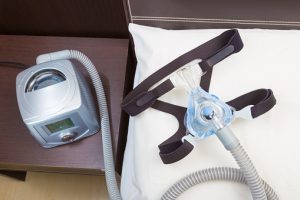
The solution to a CPAP intolerance may be a device implanted in the chest known as hypoglossal nerve stimulation (HGNS).
The device is similar to a pacemaker with a tiny generator and a sensing lead, but instead of electrical pulses like in a regular pacemaker, HGNS uses two wires to stimulate the tongue. A remote control is then used by the patient to turn it on at night and off in the morning. The device begins with a delay to allow the user to fall asleep before the stimulation begins. The device stimulates the hypoglossal nerve that controls tongue movement.
The Penn State study involved 20 participants with implanted device. The researchers found that total apnea-hypopnea index (AHI) significantly decreased by an average 35 events per hour once the device was implanted. This correlates to an average reduction of 84 percent.
In previous clinical trials, which led to the approval of the device by the FDA back in 2014, patients showed a 78 percent reduction in AHI and 80 percent reduction in oxygen desaturation events.
Lead author Richard Schwab said, “Considering that sleep apnea can lead to high blood pressure, heart attack, stroke, and other serious health problems, it is critically important that we study devices that may serve as another option instead of CPAP to treat patients with sleep apnea. There is no perfect treatment option for obstructive sleep apnea, but our preliminary data suggest that hypoglossal nerve stimulation can effectively treat patients with sleep apnea who are unable to tolerate CPAP.”
Alternative treatment options for OSA patients who can’t tolerate CPAP
There are several alternative options available to obstructive sleep apnea patients who are CPAP intolerant. Treating sleep apnea is highly important – otherwise, it can contribute to obesity, high blood pressure, diabetes, headaches, and other health issues. Alternative treatments include:
BiPAP: Similar to CPAP, it uses dual pressure – as opposed to singular as in CPAP. This device is also commonly used in those with COPD or other lung issues.
Weight loss: Oftentimes, sleep apnea is a result of extra pounds, so losing weight can help improve the condition.
Oral surgery: Pillar procedure, positional therapy, EPAP valve.
Mouth guard: Helps open up the airways.
Oral pressure therapy: Uses vacuum pressure to suction the soft palate towards the middle of the mouth for opening up nasal airways
Speak to your doctor if you are having a difficult time with your CPAP device, as there are alternative options you can try in order to help better treat your sleep apnea.